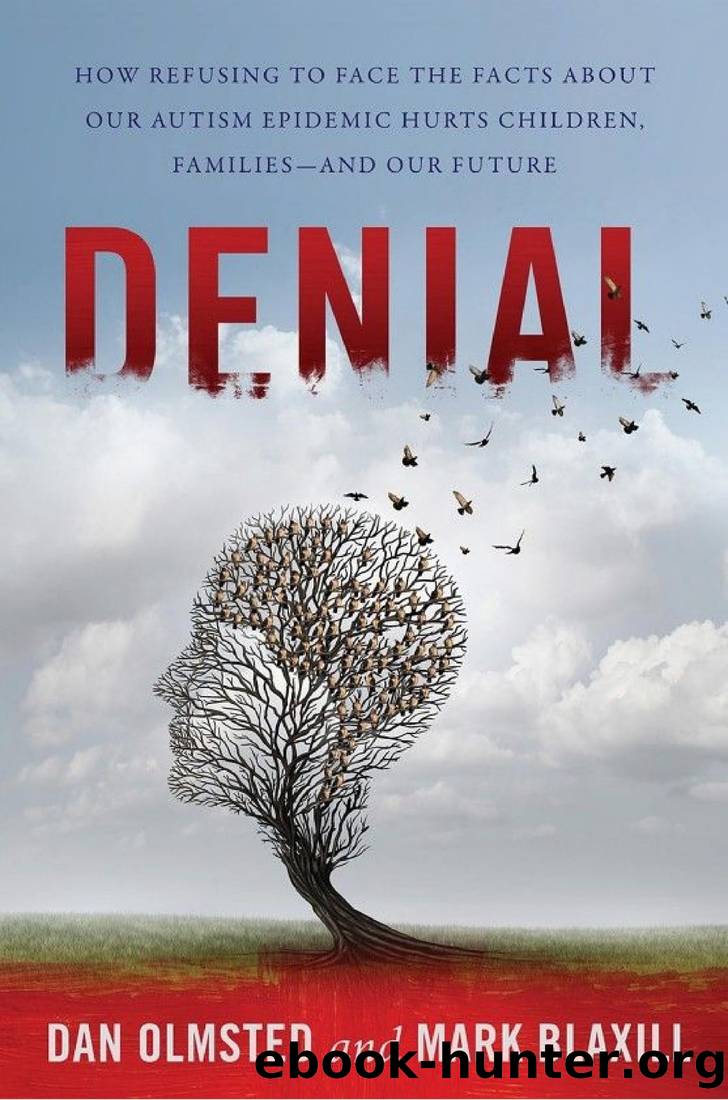Denial: How Refusing to Face the Facts About Our Autism Epidemic Hurts Children, Families, and Our Future by Mark Blaxill & Dan Olmsted

Author:Mark Blaxill & Dan Olmsted [Blaxill, Mark & Olmsted, Dan]
Language: eng
Format: epub
Tags: Autism - Antipropaganda, Autism
ISBN: 9781510716957
Google: 62SCDwAAQBAJ
Publisher: Simon and Schuster
Published: 2017-07-25T04:00:00+00:00
CHAPTER 5
Unqualified Observers
“Bullshitting is not exactly lying, and bullshit remains bullshit whether it’s true or false. The difference lies in the bullshitter’s complete disregard for whether what he’s saying corresponds to facts in the physical world: he does not reject the authority of the truth, as the liar does, and oppose himself to it. He pays no attention to it at all. By virtue of this, bullshit is a greater enemy of the truth than lies are.”
—Harry Frankfurt, Professor of Philosophy, Princeton University, On Bullshit
◆ ◆ ◆
Every journalist who has been at it for a while (in Dan’s case, four decades or so) has a treasure trove of boneheaded errors they can recount. Mistakes happen. The trick for journalists is to learn how easy it is to get things wrong before we look like complete idiots when it really matters.
By that standard, Steve Silberman, John Donvan, and Caren Zucker look foolish in things that really do matter. Beyond errors in their arguments, they make mistakes in their books that suggest they don’t really know what they’re talking about.
Donvan and Zucker make fewer mistakes but some that are quite crucial to the “branding” that is so important to them. Silberman’s argument is more powerful (which is not especially hard because Donvan and Zucker don’t really have one), but his mistakes are more egregious. Some specific mistakes they make invalidate central pieces of their case. Examples? Donvan and Zucker attempt to co-opt their discovery of Donald T. and misrepresent their own claim to journalistic priority in the discovery of “Autism’s First Child.” And as we’ve seen, Silberman makes Leo Kanner his central villain and random mad scientists his heroes, but makes jaw-dropping errors and scatters wild speculation in his quest for the perfect narrative.
Why does all this matter? To be sure, some of these mistakes have more to do with the idiosyncratic positions staked out by these three writers than with the true history and prospect of individuals and families touched by autism. But they do speak to the credibility of their arguments. In Silberman’s case, a false narrative about “Asperger’s lost tribe” is largely based in invalid evidence, so our demonstrating that matters: as the legal dictum goes, “falsus in uno, falsus in omnibus” (“false in one thing, false in everything”). Too much of what Silberman has written is just plain wrong. As for Donvan and Zucker, their quest to tell the definitive “story of autism” deserves opprobrium because so much of what they write is elliptical, overwrought, and self-serving. And like the eminent philosopher Harry Frankfurt, we need to call bullshit on that.
The Importance of Finding Donald T.
In 2005, we identified Donald T. as Donald Gray Triplett of Forest, Mississippi. The tip-off was a short paper by Leo Kanner from the 1970s.126 He referred to Donald as a bank teller in the small town of Forest, Mississippi—a classic case of too much information in this modern Internet age about a supposedly anonymous medical case study. Looking online for Donald T*
Download
This site does not store any files on its server. We only index and link to content provided by other sites. Please contact the content providers to delete copyright contents if any and email us, we'll remove relevant links or contents immediately.
When Breath Becomes Air by Paul Kalanithi(7263)
Why We Sleep: Unlocking the Power of Sleep and Dreams by Matthew Walker(5641)
Paper Towns by Green John(4169)
The Immortal Life of Henrietta Lacks by Rebecca Skloot(3826)
The Sports Rules Book by Human Kinetics(3588)
Dynamic Alignment Through Imagery by Eric Franklin(3488)
ACSM's Complete Guide to Fitness & Health by ACSM(3467)
Kaplan MCAT Organic Chemistry Review: Created for MCAT 2015 (Kaplan Test Prep) by Kaplan(3422)
Introduction to Kinesiology by Shirl J. Hoffman(3299)
Livewired by David Eagleman(3121)
The River of Consciousness by Oliver Sacks(2992)
Alchemy and Alchemists by C. J. S. Thompson(2911)
The Death of the Heart by Elizabeth Bowen(2901)
Descartes' Error by Antonio Damasio(2731)
Bad Pharma by Ben Goldacre(2729)
Kaplan MCAT Behavioral Sciences Review: Created for MCAT 2015 (Kaplan Test Prep) by Kaplan(2491)
The Gene: An Intimate History by Siddhartha Mukherjee(2491)
The Fate of Rome: Climate, Disease, and the End of an Empire (The Princeton History of the Ancient World) by Kyle Harper(2436)
The Emperor of All Maladies: A Biography of Cancer by Siddhartha Mukherjee(2430)
